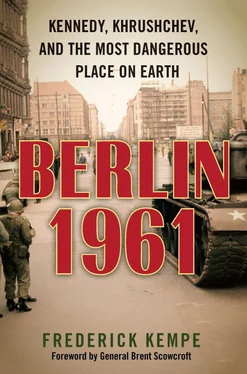Khrushchev’s Polish audience had anticipated far less drama. Having stayed on in Moscow following a celebration of the forty-first anniversary of the Bolshevik revolution, they had expected the routine rhetoric of one of communism’s countless friendship meetings. Instead, they sat in stunned silence as Khrushchev declared, “The time has obviously arrived for the signatories of the Potsdam Agreement to discard the remnants of the occupation regime in Berlin and thereby make it possible to create a normal situation in the capital of the German Democratic Republic.”
The Poles weren’t the only surprised party. Khrushchev had failed to give advance notice either to the Western signatories of the Potsdam agreement or to his socialist allies, including the East Germans. He had acted without even seeking the blessing of his own Communist Party leadership. Only shortly before the speech did Khrushchev share what he planned to say with the leader of the Polish delegation, the stunned Communist Party First Secretary Wladyslaw Gomulka. If Khrushchev meant what he said, Gomulka feared he could trigger a war over Berlin.
Khrushchev explained to Gomulka that he was acting unilaterally because he had wearied of Berlin diplomacy that was leading nowhere. He was prepared to risk a confrontation with the West, and he argued that he was in a better position to succeed than Stalin in 1948 because Moscow had now overcome the American nuclear weapons monopoly. Under a project called “Operation Atom,” Khrushchev would deploy a nuclear deterrent on East German territory within weeks. Twelve medium-range R-5 missiles would give Khrushchev the capability to respond to any U.S. nuclear attack on East Germany with counterstrikes on London and Paris—if not yet New York. Without reference to those still-secret weapons, Khrushchev told Gomulka, “Now the balance of forces is different…. Today America has moved closer to us; our missiles can hit them directly.” Though not literally true, the Soviet leader was newly in a position to annihilate Washington’s European allies.
Khrushchev did not share any details about the timing or implementation of his new Berlin plan, because he had not worked them out yet himself. What he told his Polish audience was that the Soviets and the Western Allies, according to his plan, would over time remove all their military personnel from East Germany and East Berlin. He would sign a war-ending peace treaty with East Germany and then hand over all Soviet functions in Berlin to that country, including control of all access to West Berlin. Thereafter, U.S., British, and French soldiers would need to seek East German leader Walter Ulbricht’s permission to enter any part of Berlin by road or air. Khrushchev told the Palace of Sports crowd he would consider any resistance to East Germany’s exercise of these new rights—which could include blocking air and road access to West Berlin—as an attack upon the Soviet Union itself and its Warsaw Pact alliance.
Khrushchev’s shocking escalation of the Cold War had three sources.
Above all, it was an attempt to win the attention of President Eisenhower, who had been disregarding his demands for Berlin negotiations. It seemed that no matter what Khrushchev did, he could not win the respect of American officials that he so craved.
His party rivals rightly argued that the U.S. had given him scant credit and no reward for a series of unilateral measures he had taken to reduce Cold War tensions since Stalin’s death. He had gone far beyond simply replacing the concept of inevitable war with peaceful coexistence. He had also cut Soviet troop numbers unilaterally by 2.3 million men between 1955 and 1958, and had withdrawn Soviet forces from Finland and Austria, opening the way for those countries’ neutrality. He had also encouraged political and economic reform among Soviet satellites in Eastern Europe.
The second source of Khrushchev’s impulsive Berlin move was his growing confidence in power after having put down the so-called anti-party coup against him in June 1957, led by former premiers Vyacheslav Molotov and Georgy Malenkov and his onetime mentor, Lazar Kaganovich. They had attacked him partly because of just the sort of reckless leadership style he was now demonstrating over Berlin. Unlike Stalin, he hadn’t killed them but exiled them to lesser roles far from Moscow’s power center: Molotov to Mongolia as ambassador, Malenkov to Kazakhstan to run a hydroelectric plant, and Kaganovich to the Urals to direct a small potassium factory. He thereafter removed from power his popular defense minister Marshal Georgy Zhukov, whom he also suspected of plotting against him.
To justify his bold action on Berlin, he had told his party leadership just four days before his speech that the U.S. had already abrogated the Potsdam accord first, by bringing West Germany into NATO in 1955, and then by preparing to give it nuclear weapons. After outlining his plan of action, he closed the meeting without taking the usual vote of his Presidium on matters of such significance, having sensed the possibility of opposition.
The third source of Khrushchev’s speech was Berlin itself, where the refugee bleed was accelerating. Despite his greater self-assurance in power, Khrushchev knew from personal experience that problems in the divided city could end careers in Moscow. Shortly after Stalin’s death, Khrushchev had used the threat of East German implosion to help destroy his most dangerous rival, former secret police chief Lavrentiy Beria, after Soviet troops put down the East German workers’ uprising of June 17, 1953.
At the time, Khrushchev had been only a dark horse candidate for Stalin’s succession among the collective leadership that had replaced the dictator. He was a foreign policy neophyte who saw German policy primarily through a domestic political lens. As part of his power play, Beria had led a proxy campaign against Stalinist East German leader Walter Ulbricht and his harsh policy of Aufbau des Sozialismus , or “construction of socialism.” Ulbricht had been countering internal opposition and the growing refugee numbers through escalated arrests and repression, forced collectivization of farms, accelerated industrial nationalization, greater military recruitment, and expanded censorship. The result had been an even greater out-flow of refugees in the first four months of 1953—122,000 East Germans, twice the rate of the previous year. The March 1953 figure of 56,605 was six times larger than a year earlier.
At a decisive party leadership meeting, Beria had said, “All we need is a peaceful Germany. Whether it is socialist or not isn’t important to us,” even if it were “united, democratic, bourgeois and neutral.” Beria wanted to negotiate substantial financial compensation from the West in exchange for Soviet agreement to a neutral, unified Germany. He had even assigned one of his most loyal lieutenants to explore such a deal with Western countries. “What does it amount to, this GDR?” Beria had asked, using the abbreviation for East Germany’s misleading official name. “It’s only kept in existence by Soviet troops, even if we do call it the German Democratic Republic.”
The post-Stalin collective leadership did not heed Beria’s call to abandon the socialist cause in East Germany, but it did demand that he reverse what it called his “excesses.” Following Soviet orders, Ulbricht stopped new agricultural collectives and ended large-scale political arrests; introduced an amnesty for many political prisoners; reduced the repression of religious freedoms; and expanded the production of consumer goods.
Khrushchev took little active part in the debates that produced this abrupt policy change, but he also didn’t oppose the reforms. He then watched the loosening of Stalinist controls inspire an uprising that might have prompted East Germany’s collapse if Soviet tanks had not intervened.
Читать дальше











